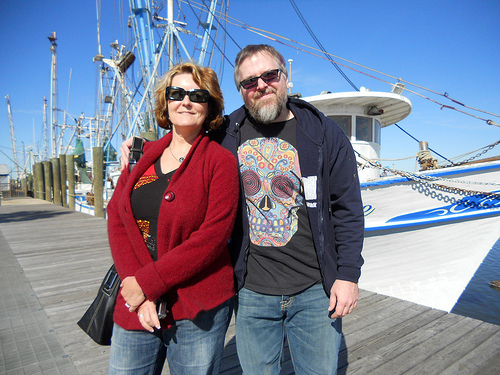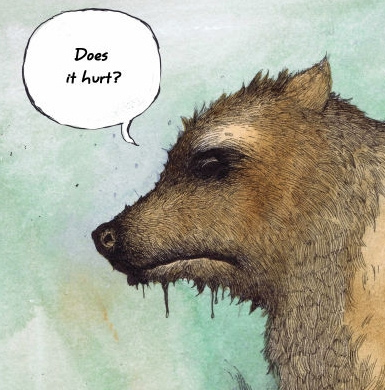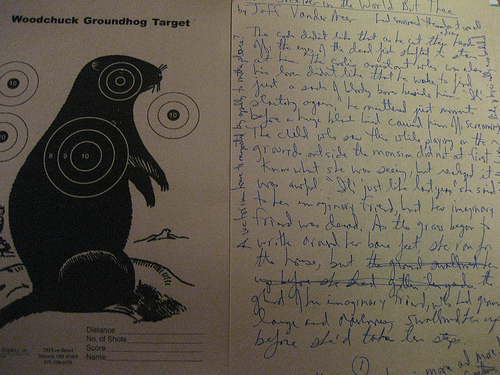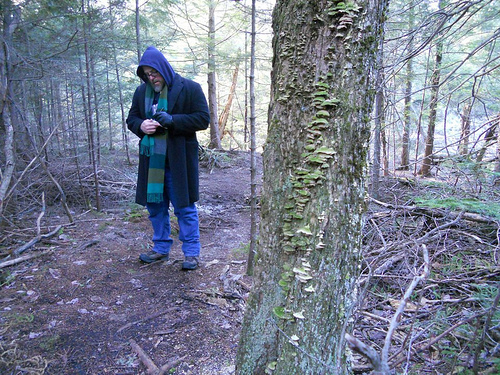Jeff VanderMeer's Blog, page 36
January 25, 2012
The Situation Web Comic–Part 1–Now Up On Tor.com
Part 1 of the web comic version of my story The Situation, with art by Eric Orchard, is now up on Tor.com! Go read it, and come back tomorrow and Friday for the concluding chapters.
A special thank you to editor Liz Gorinsky, who evidenced amazing patience and kindness while we worked on this thing.
You can read the story the comic is based on at GeekDad.
The Situation Web Comic–Part 1–Now Up On Tor.com originally appeared on Ecstatic Days on January 25, 2012.
January 24, 2012
The Weird Antho: 750,000 Words of Fiction, Now Available to North American Readers in E-Book Form…

The Weird: A Compendium of Strange and Dark Stories is now available a a North American ebook from all major retailers, including Amazon.com . The North American print version comes out in May. The publisher is Tor, and our editor there is Liz Gorinsky. The anthology, which is almost 1,200 pages and includes over 750,000 words of weird fiction, including a couple of short novels, is already being taught at several universities. Here's some of the UK praise for the antho….
. The North American print version comes out in May. The publisher is Tor, and our editor there is Liz Gorinsky. The anthology, which is almost 1,200 pages and includes over 750,000 words of weird fiction, including a couple of short novels, is already being taught at several universities. Here's some of the UK praise for the antho….
'The definitive collection of weird fiction… its success lies in its ability to lend coherence to a great number of stories that are so remarkably different and yet share the same theme'?–?Times Literary Supplement
'Studded with literary gems, it's a hefty, diligently assembled survey of a genre that manages to be at once unsettling, disorientating and bracing in its variety.' – James Lovegrove, Financial Times
'It's a tremendous experience to go through its 1,126 pages… there are so many delights in this that any reader will find something truly memorable' – Scotland on Sunday
'Readers eager to explore a world beyond the ordinary need look no further' – Time Out
'An anthology of writing so powerful it will leave your reality utterly shredded…Give yourself to the weird! Open the pages of the new gospel of The Weird.' – Guardian.co.uk
Our new site/magazine Weirdfictionreview.com is made possible by the research we did for The Weird, and you can find this antho-related content there, in addition to over 90 other posts about weird fiction, including lots of stories, essays, and interviews.
Uncanny paragraphs from The Weird
A Century of First Lines from the stories in The Weird
The Weird table of contents, also reproduced below the cut. Please note that for the North American e-book only the Buzzatti stories has been dropped and J. Robert Lennon's "Portal" (2010) added.
****
More than eighteen nationalities are represented and seven new translations were commissioned for the book, most notably definitive translations, by Gio Clairval, of Julio Cortazar's "Axolotl" and Michel Bernanos' short novel "The Other Side of the Mountain" (the first translations of these classics in over fifty years). The publishers believe this is the largest volume of weird fiction ever housed between the covers of one book.
Strands of The Weird represented include classic US/UK weird tales, the Belgian School of the Weird, Japanese weird, Latin American weird, Nigerian weird, weird SF, Feminist weird, weird ritual, general international weird, and offshoots of the weird originating with Surrealism, Symbolism, and the Decadent movement.
Although anchored in many familiar and iconic names?—?including Stephen King, Shirley Jackson, Jorge Luis Borges, Octavia Butler, Clive Barker and George R.R. Martin?—?The Weird also gave us an opportunity to showcase several great writers not as well known to readers of the weird. French master of weird fiction Claude Seignolle, for example, is represented herein with "Ghoulbird." Readers will also be delighted to discover the work of the great Catalan writer Merce Rodoreda (with the phantasmagorical "Salamander"), grotesqueries by English surrealist Leonora Carrington, an excerpt from Kafka precursor Alfred Kubin's cult classic The Other Side, and Hagiwara Sakutoro's quintessential rumination on the boundary between reality and the weird, "The Town of Cats."
Other highlights include the short novels / long novellas "The Beak Doctor" by Eric Basso, "Tainaron" by Leena Krohn, and "The Brotherhood of Mutilation" by Brian Evenson.
Table of Contents
Foreweird by Michael Moorcock
Introduction by the Editors
Afterweird: China Mieville
Story order is chronological except for a couple of exceptions transposed for thematic reasons. Stories translated into English are largely positioned by date of first publication in their original language. Authors are North American or from the United Kingdom unless otherwise indicated.
Alfred Kubin, "The Other Side" (excerpt), 1908 (translation, Austria)
F. Marion Crawford, "The Screaming Skull," 1908
Algernon Blackwood, "The Willows," 1907
Saki, "Sredni Vashtar," 1910
M.R. James, "Casting the Runes," 1911
Lord Dunsany, "How Nuth Would Have Practiced his Art," 1912
Gustav Meyrink, "The Man in the Bottle," 1912 (translation, Austria)
Georg Heym, "The Dissection," 1913 (new translation by Gio Clairval, Germany)
Hanns Heinz Ewers, "The Spider," 1915 (translation, Germany)
Rabindranath Tagore, "The Hungry Stones," 1916 (India)
Luigi Ugolini, "The Vegetable Man," 1917 (new translation by Anna and Brendan Connell, Italy; first-ever translation into English)
A. Merritt, "The People of the Pit," 1918
Ryunosuke Akutagawa, "The Hell Screen," 1918 (new translation, Japan)
Francis Stevens (Gertrude Barrows Bennett), "Unseen?—?Unfeared," 1919
Franz Kafka, "In the Penal Colony," 1919 (translation, German/Czech)
Stefan Grabinski, "The White Weyrak," 1921 (translation, Poland)
H.F. Arnold, "The Night Wire," 1926
H.P. Lovecraft, "The Dunwich Horror," 1929
Margaret Irwin, "The Book," 1930
Jean Ray, "The Mainz Psalter," 1930 (translation, Belgium)
Jean Ray, "The Shadowy Street," 1931 (translation, Belgium)
Clark Ashton Smith, "Genius Loci," 1933
Hagiwara Sakutaro, "The Town of Cats," 1935 (translation, Japan)
Hugh Walpole, "The Tarn," 1936
Bruno Schulz, "Sanatorium at the Sign of the Hourglass," 1937 (translation, Poland)
Robert Barbour Johnson, "Far Below," 1939
Fritz Leiber, "Smoke Ghost," 1941
Leonora Carrington, "White Rabbits," 1941
Donald Wollheim, "Mimic," 1942
Ray Bradbury, "The Crowd," 1943
William Sansom, "The Long Sheet," 1944
Jorge Luis Borges, "The Aleph," 1945 (translation, Argentina)
Olympe Bhely-Quenum, "A Child in the Bush of Ghosts," 1949 (Benin)
Shirley Jackson, "The Summer People," 1950
Margaret St. Clair, "The Man Who Sold Rope to the Gnoles," 1951
Robert Bloch, "The Hungry House," 1951
Augusto Monterroso, "Mister Taylor," 1952 (new translation by Larry Nolen, Guatemala)
Amos Tutuola, "The Complete Gentleman," 1952 (Nigeria)
Jerome Bixby, "It's a Good Life," 1953
Julio Cortazar, "Axolotl," 1956 (new translation by Gio Clairval, Argentina)
William Sansom, "A Woman Seldom Found," 1956
Charles Beaumont, "The Howling Man," 1959
Mervyn Peake, "Same Time, Same Place," 1963
Dino Buzzati, "The Colomber," 1966 (new translation by Gio Clairval, Italy)
Michel Bernanos, "The Other Side of the Mountain," 1967 (new translation by Gio Clairval, France)
Merce Rodoreda, "The Salamander," 1967 (translation, Catalan)
Claude Seignolle, "The Ghoulbird," 1967 (new translation by Gio Clairval, France)
Gahan Wilson, "The Sea Was Wet As Wet Could Be," 1967
Daphne Du Maurier, "Don't Look Now," 1971
Robert Aickman, "The Hospice," 1975
Dennis Etchison, "It Only Comes Out at Night," 1976
James Tiptree Jr. (Alice Sheldon), "The Psychologist Who Wouldn't Do Awful Things to Rats," 1976
Eric Basso, "The Beak Doctor," 1977
Jamaica Kincaid, "Mother," 1978 (Antigua and Barbuda/US)
George R.R. Martin, "Sandkings," 1979
Bob Leman, "Window," 1980
Ramsey Campbell, "The Brood," 1980
Michael Shea, "The Autopsy," 1980
William Gibson/John Shirley, "The Belonging Kind," 1981
M. John Harrison, "Egnaro," 1981
Joanna Russ, "The Little Dirty Girl," 1982
M. John Harrison, "The New Rays," 1982
Premendra Mitra, "The Discovery of Telenapota," 1984 (translation, India)
F. Paul Wilson, "Soft," 1984
Octavia Butler, "Bloodchild," 1984
Clive Barker, "In the Hills, the Cities," 1984
Leena Krohn, "Tainaron," 1985 (translation, Finland)
Garry Kilworth, "Hogfoot Right and Bird-hands," 1987
Lucius Shepard, "Shades," 1987
Harlan Ellison, "The Function of Dream Sleep," 1988
Ben Okri, "Worlds That Flourish," 1988 (Nigeria)
Elizabeth Hand, "The Boy in the Tree," 1989
Joyce Carol Oates, "Family," 1989
Poppy Z Brite, "His Mouth Will Taste of Wormwood," 1990
Michal Ajvaz, "The End of the Garden," 1991 (translation, Czech)
Karen Joy Fowler, "The Dark," 1991
Kathe Koja, "Angels in Love," 1991
Haruki Murakami, "The Ice Man," 1991 (translation, Japan)
Lisa Tuttle, "Replacements," 1992
Marc Laidlaw, "The Diane Arbus Suicide Portfolio," 1993
Steven Utley, "The Country Doctor," 1993
William Browning Spenser, "The Ocean and All Its Devices," 1994
Jeffrey Ford, "The Delicate," 1994
Martin Simpson, "Last Rites and Resurrections," 1994
Stephen King, "The Man in the Black Suit," 1994
Angela Carter, "The Snow Pavilion," 1995
Craig Padawer, "The Meat Garden," 1996
Stepan Chapman, "The Stiff and the Stile," 1997
Tanith Lee, "Yellow and Red," 1998
Kelly Link, "The Specialist's Hat," 1998
Caitlin R. Kiernan, "A Redress for Andromeda," 2000
Michael Chabon, "The God of Dark Laughter," 2001
China Mieville, "Details," 2002
Michael Cisco, "The Genius of Assassins," 2002
Neil Gaiman, "Feeders and Eaters," 2002
Jeff VanderMeer, "The Cage," 2002
Jeffrey Ford, "The Beautiful Gelreesh," 2003
Thomas Ligotti, "The Town Manager," 2003
Brian Evenson, "The Brotherhood of Mutilation," 2003
Mark Samuels, "The White Hands," 2003
Daniel Abraham, "Flat Diana," 2004
Margo Lanagan, "Singing My Sister Down," 2005 (Australia)
T.M. Wright, "The People on the Island," 2005
Laird Barron, "The Forest," 2007
Liz Williams, "The Hide," 2007
Reza Negarestani, "The Dust Enforcer," 2008 (Iran)
Micaela Morrissette, "The Familiars," 2009
Steve Duffy, "In the Lion's Den," 2009
Stephen Graham Jones, "Little Lambs," 2009
K.J. Bishop, "Saving the Gleeful Horse," 2010 (Australia)
The Weird Antho: 750,000 Words of Fiction, Now Available to North American Readers in E-Book Form… originally appeared on Ecstatic Days on January 24, 2012.
Bruno Schulz at Weirdfictionreview.com
If you head on over to our Weirdfictionreview.com, you'll find the first official publication of the new John Curran Davis translation of Polish genius Bruno Schulz's "The Sanatorium Under the Sign of the Hourglass," as well as a wonderful, fascinating interview with the translator about Schulz. We're also running an intro to Schulz's life and work, and my own short editorial on the "unfilmability" of Schulz. We will continue to bring you "firsts" at WFR.com, just as we did when we brought you Jean Ray fiction and several of the other pieces we've run. Go check it out.
This morning we're also running a feature on Julio Cortazar…not too shabby…
Bruno Schulz at Weirdfictionreview.com originally appeared on Ecstatic Days on January 24, 2012.
January 23, 2012
Trinity Prep Event: Ann and Jeff VanderMeer, Feb 9, Orlando
Ann and I will be conducting workshops, lecturing, and meeting with the students at Trinity Prep School in Orlando as part of their visiting writer series in early February.
On January 9th we'll be doing a reading/presentation that's open to the general public. I'll probably read from my novel-in-progress, "Borne" and Ann will present a powerpoint of great images and insight from various editorial projects. Might even be some Steampunk Bible bling and special surprises. Kathmandu Books will be supplying the books for sale.
The event is February 9, a Thursday, starting at 7pm at Trinity Prep School, in the Kelly Kranze Room, 5700 Trinity Prep Lane, Winter Park, Florida. For directions, visit http://www.trinityprep.org
Looking forward to meeting the students, seeing old friends, and meeting some of our readers.
Trinity Prep Event: Ann and Jeff VanderMeer, Feb 9, Orlando originally appeared on Ecstatic Days on January 23, 2012.
January 20, 2012
Writers: I Highly Recommend Woodchuck Groundhog Target Paper
Woodchuck Groundhog target paper—the blank side–is great for writing longhand. The grain of the paper is just right to catch and hold the pen and the ink without being either too smooth or too rough. The pads hinge on the right, so it's also perfect for left-handers like myself.
The Squirrel target paper appears identical, but isn't as classy.
Enjoy your Friday!
Writers: I Highly Recommend Woodchuck Groundhog Target Paper originally appeared on Ecstatic Days on January 20, 2012.
January 19, 2012
Story and Novel VanderMeer Critique Service: Now With Gift Wrap!

(This image of the editor at a burnt-out desk in a quarry may not accurately portray his critique style…)
I'm extending my critique service for a bit. Just email me at vanderworld at hotmail.com for details. In addition to my writing career, I have 25 years of experience as an editor and have won several awards for it, including the World Fantasy Award. I've also taught workshops all over the world, worked for publishers, run a publishing company, been an agent, etc. Stories, novellas, and novels in just about every category (no Westerns) welcome. The unique rate system and form-fitting approach to your particular manuscript are meant to give the most useful feedback.
You can also now buy a critique for the writer in your life–for no extra charge I will send a hand-written card, illustrated, with certificate for critique. A few people have asked for this, and it's gone over well, so I've decided to offer it publicly.
As you may know, we fund a lot of fiction translations and other efforts with a risky rate of return. Critique work helps to offset the risk. Thanks!
Story and Novel VanderMeer Critique Service: Now With Gift Wrap! originally appeared on Ecstatic Days on January 19, 2012.




Writers and Their Literary Estates: Story Reprints
Since the early 1990s, my wife Ann and I have edited or co-edited more than sixteen anthologies containing somewhere shy of three millions words of fiction. Some of those anthologies have collected original fiction, but about half have been reprint anthologies, including the massive 750,000-word The Weird, our most recent effort. Based on these projects, we would suggest that writers think carefully about their wills and their literary estates. This same thought should apply to representation while living, if the writer does not directly control reprint rights to stories, or is not the person an anthologist must contact to acquire those rights. The following thoughts are also offered in the context that about 75 percent of the time, negotiations are conducted in a professional and timely manner.
***
One way in which writers gain more exposure is by being reprinted in anthologies, or reprinted in magazines. In the case of cult writers, sometimes limited edition reprint collections are also a way to keep someone's work alive. Writers who do not take the time to create a will with provisions for the handling of their literary estate may help make their work more obscure than it should be, and deprive readers of great fiction for reasons unrelated to an anthologist's or editor's desire to include them.
To a least some extent, the ease with which an anthologist can contact a writer's representative and obtain rights to a story speaks to how often that writer will be reprinted. A nonresponsive agent, publisher, or literary estate is just one of an anthologist's worries. Another is, believe it or not, active hostility toward the request. A third is a mis-understanding of the marketplace wherein a writer's representative asks for such an exorbitant fee that the anthologist cannot reprint the story, or a desire to treat the rights as if they were shares in a company, and to not allow any reprinting, hoping the value goes up. A fourth problem is, to be blunt, such inadvertent incompetence that a deal cannot be struck. A fifth problem in the modern era is simply a mis-understanding about what e-book rights mean. These are very simple situations, while others, like family members squabbling over who represents the rights, can be an entirely more complicated scenario.
If reprint rights are difficult to get, for whatever reason, including requiring undue time and effort to negotiate, a writer's legacy may suffer over time, especially for those writers who specialized in short stories and/or were midlist or indie-press during their lifetimes. If it is hard to find out who holds the rights, this also creates a barrier to reprinting material. (Note that we are not suggesting that anthologists should be given stories for nothing, nor do we believe a writer's legacy depends solely on these kinds of reprints.)
Because no one can predict who will gain or flag in popularity over time, the upshot is that no matter how little-known you are—perhaps even because you are little-known—you need a will that clearly sets out who will handle your literary estate and how that estate should operate.
Neil Gaiman has some great thoughts about wills here, to which we would just append the following observations. (Gaiman's people, as you might expect, are awesome to deal with on reprints.)
—Make sure you designate a clear chain-of-command. Include contingency plans in case your first choice passes away.
—Choose individuals to represent you who are business-competent and computer savvy, but who also love books and agree with your ideas about your legacy.
—Make your desires as to how requests for reprints should be handled crystal-clear.
—When negotiating contracts for short story collections, retain your right to permit reprint of individual stories so that you can control exactly how easy (or difficult, if that is your wont) it is for stories to be reprinted.
—Consider allowing your work to be reprinted for free after a limited period, like 40 years, as opposed to the current 70 years.
As you can imagine, all of this is also important with regard to novel-length fiction, especially in cases where a writer's existing publisher allows titles to fall out of print some time after a writer's death. Of course, a writer cannot predict every scenario, but having a good plan in place can help immeasurably. Some writers even set up literary corporations while alive, in part to deal with these issues.
Finally, thanks to all of those wonderful writers, agents, estates, and publishers who help make this advice pointed toward exceptions to the rule.
Writers and Their Literary Estates: Story Reprints originally appeared on Ecstatic Days on January 19, 2012.




January 18, 2012
Genre versus Mainstream
SOPA would reduce us to entertainment like this. Is that what you want?
Genre versus Mainstream originally appeared on Ecstatic Days on January 18, 2012.
Things I Know?
After 25-plus years in the book world, I will admit I don't know as much as I should, I suppose. In a way, I don't want to have Things I Know, because the terrain shifts and you spend some portion of your time adjusting to the current even as you try also think strategically about how you can find the space and opportunity to create what's most personal to you—and make it a success career-wise.
But I do know a few things from simply being immersed in this world for so long. They tend to apply generally, and I make no claims for them being unique…I just know I sometimes need to remember even what might seem very basic, especially at the start of a new year.
—If you survive and your enemy survives, then over time, your enemy may well become your friend, or at least your cordial colleague. Because so many writers, reviewers, editors tend to fall away over the years, there is a kind of respect that you build up with those in the field who you may have been at odds with, and they with you the longer you're both around. Don't under-estimate this effect, and recognize that the reason you may have butted heads in the first place (and survived) is because you share personality traits and other commonalities not at first apparent. I also find that sometimes there is a false impression of intent—for example, a writer who for 10 years thought I hated his writing, even though this was not the case.
—Holding a grudge is counterproductive and has a ripple effect. I know writers who still won't talk to someone else because of a perceived insult from 20 years ago. The grudge has not only closed them off from a potential friend or a former close friend but also influenced their dealings with others perceived as allies of the other party. I can't pretend to understand this behavior—there are only four people on my sh*tlist after 25 years and all four did things comparable to putting babies on spikes, but for anything below that threshold…forgiveness is something that can be difficult because it requires swallowing your pride, but it's important—again, in part because of the ripple effect (even inadvertent punishment of others is wrong) and because people aren't just one thing. More than once, I've found, for example, that crapulous behavior occurred during a time of great stress that the other party wasn't willing to admit. (Misunderstandings seem to have gotten worse because of the internet, as well.)
—Buying into a personal mythology of hierarchical status can harm your career. It's one thing to expect respect for your work and experience. It's quite another to expect demonstrations of your status or to make pronouncements like "I will not attend any conventions at which I am not a guest of honor." Such pronouncements or ideas are, ironically enough, more likely in writers who have achieved some cult status, whereby they receive daily affirmation from a small but devoted group of fans, which distorts their view of themselves over time. This is also a way of closing off communication and connection, and it winds up harming you. (Excluded from this, of course, are commercial superstars who receive so many invites that there's no time to do anything else!)
—Buying into the idea of achieving mastery harms your writing. Mastery is an illusion because writing is multi-directional. You can reasonably assume you will over time, if you're a good writer, achieve "mastery" in certain areas, types of stories, techniques…but even though it could be argued there are a finite number of stories to tell, there are an infinite number of combinations of elements and approaches to create a story. Generally, if a writer thinks they've achieved mastery, they've simply achieved some success within one area of fiction, which may or may not even signify "mastery" of some element anyway. The point being that every writer eventually enters a decaying orbit, and satisfaction with one's mastery of writing is one sign of that process reaching its end stages. At the very least, a plateau may have been reached. (For some, there's no harm in this–some writers basically tell the same story their entire lives, and throughout their careers they are simply seeking to tell that story more and more perfectly.)
—Fear and taking the short-term view will harm not just your career but your creativity. Conversely, taking chances while keeping the long-term in mind will often reward you. But the important thing here is beating the fear. Even writing itself is often about beating the fear–evading the fear that comes with the editorial mind-set, which can rob you of the confidence to write. In the broader sense, it's fear that makes us not push outside of our comfort zones. It's fear that tells us we're not worthy of an opportunity. It's fear that tells us this new thing isn't something we can actually accomplish. Jumping in with both feet while being aware of the long-term effects of what you're doing is so important. Saying yes is so important. As important? Don't fall into patterns of paranoia and bitterness. Something is always going to go wrong in your career. There's no getting around that. You can lose yourself in circles of why that turn your world into a place where you only see the negative. This just feeds the fear more, and gives you more excuses to not do something.
—Friendship is more important than career advancement. Even beyond the obvious reasons why you shouldn't screw over your friends, the practical, cynical truth is that very few things that seem important at the time will turn out to be important over time. (I'm not someone who screws over friends anyway—it's more that I get so busy, I wind up not having time for old friends as much as I should.)
—Friendship is not as important as doing the right thing. As in most fields, writers tend to be friends with fellow writers and editors, among others connected to the book field. You're not doing your friend any favors by sugar-coating a critique, favoring them without due cause in a reviewing or during awards season, or any other situation, etc.
—Paying it forward and being open with information is important for the long-term health of the book culture. It's a myth that anyone makes it on their own. You may make it despite the odds, but you still had help along the way—people sympathetic to what you wanted to do. The most positive thing you can do is return is help other people when you can. The impulse to hoard information or to not be of use usually comes from the impression that you yourself may be ill-served by doing so. But in actual fact, this is rarely so. The connectivity and communication you engage in usually results in all kinds of creative collaborations and opportunities over time. And I don't mean in a cynical "you owe me way," but just naturally as a result of being willing to be open.
—A sense of humor and an appreciation of the absurd are a huge plus. Without a sense of humor, I'm not sure how a writer survives, given that humor is so important to taking a long-view approach (time plus tragedy equals humor). A healthy appreciation for the absurd is an additional survival attribute that helps to put things in perspective.
Things I Know? originally appeared on Ecstatic Days on January 18, 2012.
January 14, 2012
Leaning on the Sea Wall
I've been a bit silent on the blog the last couple of weeks, mostly because I've been struck by a novel idea that's working through my thoughts quite a bit, and onto the page as well. One of the pivotal images is of the main character leaning on a sea wall made of coquina in a seaside city somewhat like a larger St. Augustine, Florida. It's the character's safe place, in a sense, where a sense of calm settles over him and an idea that came to me when Tessa Kum was visiting us and we took a ghost tour in St. Augustine that included the old fort. It's from there that the character became more than satirical or a cardboard cut-out to prove a point.
The sea wall is a potent image for me, too, because the ocean and the beach have always had a powerful effect on me, and leaning on the sea wall, looking out over the marsh flats and the water of the bay is as calming for me as for the character. It gives me an affinity for the character, a way in to understanding by transference of my own emotion to the character, and then, in a sense, back again.
Standing there that night, too, I was thinking of the ways in which I'm in transition. There is before Ambergris (the setting of my three main novels) and after Ambergris, and there is also before The Weird and after The Weird, in terms of anthologies edited. On the other side of this sea wall there's another and different world. It may share similarities to the old world, but only a few, I think.
Today, we went to a different part of Florida, Apalachicola, with our friend Cat Sparks, and had a lovely time on the coast, enjoying an oyster festival, a walk around the shops, and then a meal by the beach. The coastline along the way is beautiful but often also with a sense of starkness or desolation, in part due to the enduring signs of wreckage from hurricanes. Whole towns here have become unpopulated and been returned to the vegetation. The ruins of old time attractions made irrelevant by Disney are also hidden here and there. Wildlife is in abundance, thriving due to a unique ecosystem and quite frankly the recession, which killed the murderous real estate deals that might have threatened them. It's called the "forgotten coast" but it's not really forgotten, it's just more mysterious and in some ways more full of life than other places in Florida.
There was no sea wall, but it felt as if there were in a strange way, and in talking about writing and publishing and editing, about finding commonalities with people and about, really, the idea of being passionate and engaged in what you do, I'm seeing more and more clearly the course for new novels, more outreach, more teaching, and more work with translations.
I'll be posting sporadically for the next week, because we are definitely in transition, with new projects in the works but not yet at the point where they can be announced, and a lot of fiction to write.

(Ann's photo of me and Cat Sparks on the coast today.)
Leaning on the Sea Wall originally appeared on Ecstatic Days on January 14, 2012.








